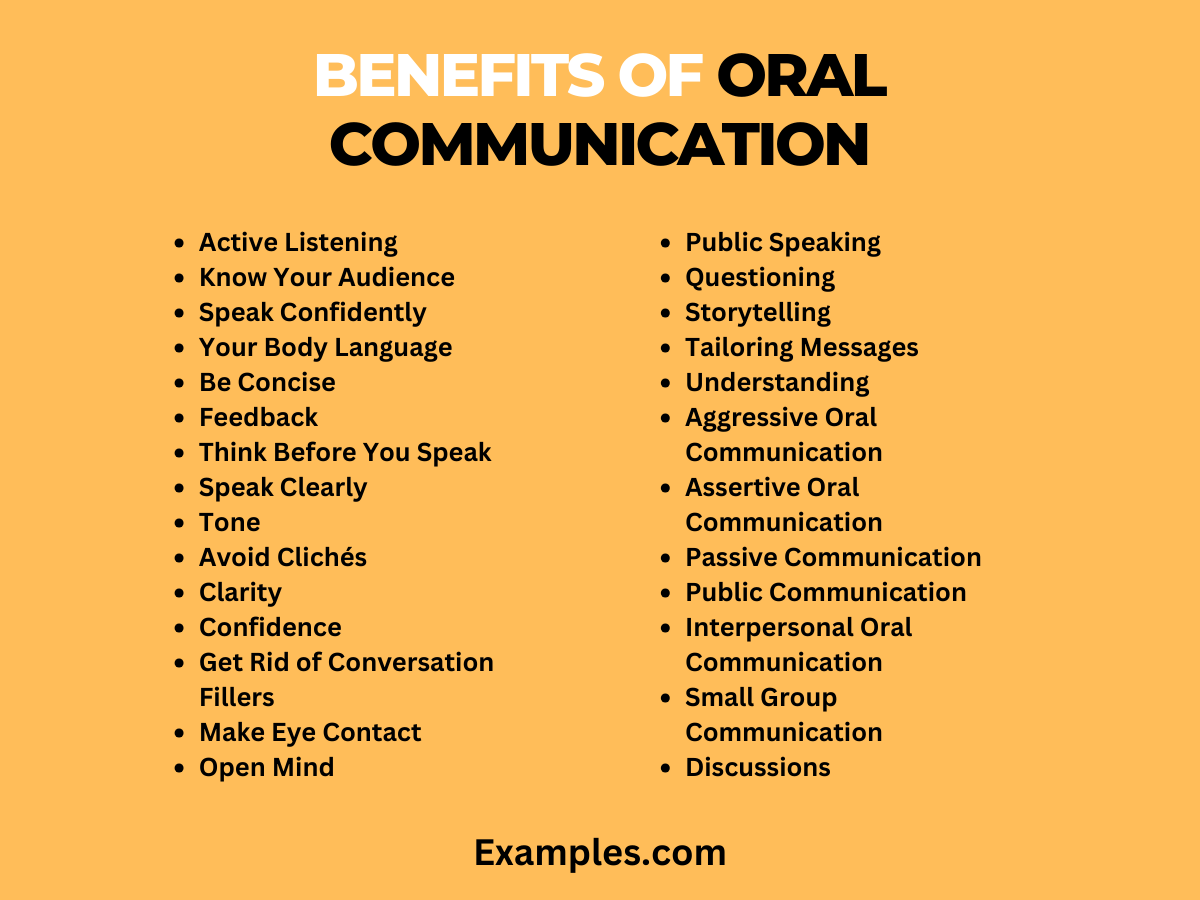29+ Benefits of Oral Communication Examples
The “Benefits of Oral Communication” encompass more than just the transfer of information; they extend to the realms of relationship building and effective leadership. Mastering the art of oral communication, which includes key skills like active listening and speaking confidently, is fundamental in both personal and professional settings. It enables clearer expression of ideas, fosters mutual understanding, and enhances interpersonal connections. This complete guide delves into how these benefits can transform interactions, making them more impactful and meaningful. Whether in a boardroom or a casual conversation, the advantages of proficient oral communication are invaluable.
Benefits of Effective Oral Communication?
Effective oral communication is a pivotal skill in personal and professional settings. It encompasses a range of abilities, from public speaking to interpersonal communication, and has far-reaching benefits. This guide explores these benefits in detail, emphasizing its significance in various contexts.
Enhances Clarity and Understanding
Effective oral communication ensures that the message is conveyed clearly and understood correctly. This clarity is crucial in avoiding misunderstandings and errors, especially in complex or high-stakes situations. For instance, in a business meeting, speaking clearly and concisely ensures that all team members understand their roles and responsibilities.
Builds Strong Relationships
The ability to communicate well orally is vital in building and maintaining strong relationships. Whether in a professional setting or personal life, clear and empathetic communication fosters trust and respect. This is particularly evident in roles requiring active listening, like counseling or management.
Facilitates Decision Making
In decision-making processes, the ability to articulate thoughts and opinions clearly can significantly influence the outcome. Oral communication skills enable individuals to present their ideas convincingly, contributing to more informed and effective decision-making.
Boosts Confidence and Personal Growth
Effective oral communication is closely tied to self-confidence. As individuals become more proficient in expressing themselves, their confidence in various situations, such as public speaking or interviews, increases. This, in turn, contributes to personal growth and self-assurance.
Improves Public Speaking Skills
Oral communication is fundamental in public speaking. Proficiency in this area allows individuals to engage and persuade audiences effectively, whether in a formal presentation or an impromptu speech. This skill is particularly beneficial in leadership roles and public-facing professions.
Enhances Professional Opportunities
In the workplace, strong oral communication skills can open doors to numerous opportunities. From acing job interviews to leading team meetings, the ability to communicate effectively is often linked to career advancement and professional success.
Supports Effective Feedback
Feedback, both giving and receiving, is an essential part of personal and professional development. Effective oral communication skills ensure that feedback is constructive, clear, and beneficial, thereby promoting continuous improvement and learning.
Encourages Active Participation
Good oral communication skills encourage active participation in discussions and collaborations. When individuals feel confident in their speaking abilities, they are more likely to contribute their ideas and insights, enriching group dynamics and outcomes.
Facilitates Conflict Resolution
In conflict situations, the ability to communicate calmly and effectively is crucial. Oral communication skills help in articulating points without escalation, leading to more amicable and productive resolutions.
Promotes Cultural Understanding
In today’s globalized world, effective oral communication aids in bridging cultural gaps. Understanding and adapting to different communication styles and norms is key in fostering cross-cultural relationships and collaborations.
30 Benefits of Oral Communication

Oral communication plays a pivotal role in personal and professional settings. Mastering this skill can yield numerous benefits, enhancing both personal interactions and workplace efficiency. Below is a detailed exploration of 30 distinct characteristics of effective oral communication, complete with explanations and practical example sentences.
1. Active Listening
Active listening is a vital communication skill, involving full attention to the speaker, understanding their message, and responding thoughtfully. It’s more than just hearing words; it’s about comprehending the underlying emotions and intentions. Active listeners show empathy, ask clarifying questions, and avoid interrupting. This approach fosters deeper connections, reduces misunderstandings, and enhances mutual respect. In the workplace, active listening contributes to better teamwork, problem-solving, and conflict resolution.
Example: “I hear your concerns about the project deadline and will address them.”
2. Know Your Audience
Understanding your audience is crucial for effective communication. It involves recognizing their interests, background, and level of understanding to tailor your message accordingly. Knowing your audience helps in choosing the right tone, language, and examples, making your communication more relatable and impactful. This skill is particularly important in marketing, teaching, and public speaking, where connecting with the audience’s needs and expectations can significantly influence the effectiveness of the message conveyed.
Example: “Since you’re all tech enthusiasts, let’s dive deep into the software’s features.”
3. Speak Confidently

Speaking confidently is key to persuasive and impactful communication. It involves expressing your thoughts clearly and assertively, without appearing arrogant. Confidence in speaking comes from thorough knowledge of the subject, preparation, and a positive mindset. It helps in gaining the trust and attention of the audience, whether in public speaking, presentations, or everyday conversations. A confident speaker can inspire, motivate, and influence others, making this skill invaluable in leadership and personal growth.
Example: “I am certain that our strategy will yield positive results.”
4. Your Body Language
Body language plays a crucial role in communication, often conveying more than words. It includes gestures, facial expressions, posture, and eye contact. Positive body language can enhance a verbal message by adding emphasis or showing sincerity, while negative body language can contradict or undermine spoken words. Being aware of your body language and interpreting others’ non-verbal cues can greatly improve interpersonal interactions, making it a key skill in personal and professional settings.
Example: “Standing tall, I conveyed my point with clarity.”
5. Be Concise
Being concise in communication means expressing your message in a clear, straightforward, and brief manner. It involves eliminating unnecessary words and focusing on the main points. Conciseness helps in holding the audience’s attention, making your message more digestible and effective. This skill is particularly valuable in professional environments where time is limited, such as meetings or presentations. Conciseness combined with clarity ensures that your message is understood and remembered.
Example: “Our goal is to increase sales by 20% this quarter, straightforward and achievable.”
6. Feedback
Feedback in oral communication is crucial for ensuring your message is understood and for improving future interactions. It involves actively listening to the responses of your audience, understanding their perspectives, and adjusting your communication accordingly. Effective feedback helps in identifying areas of misunderstanding, enhancing clarity, and building stronger relationships. It’s not just about receiving input but also about giving constructive responses that foster open dialogue and continuous improvement in communication skills.
Example: “I appreciate your input; it helps refine our approach.”
7. Think Before You Speak

Thinking before speaking is essential for effective communication. This practice involves pausing to organize your thoughts, considering the impact of your words, and choosing the right way to express them. By doing so, you avoid misunderstandings, offensive remarks, and hasty conclusions. This approach allows for more thoughtful, clear, and relevant communication, ensuring that your message is conveyed in the best possible manner and received positively by your audience.
Example: “After a thoughtful pause, I shared my perspective on the issue.”
8. Speak Clearly
Clear speech is fundamental in oral communication. It involves articulating words distinctly, using appropriate language, and structuring your sentences logically. Speaking clearly makes it easier for the audience to understand your message without confusion. It’s crucial in diverse settings, from casual conversations to professional presentations. Clear communication prevents misunderstandings, saves time, and ensures that your ideas are conveyed effectively, enhancing overall communication effectiveness.
Example: “I articulated the steps clearly, ensuring everyone understood.”
9. Tone
The tone of your voice significantly influences how your message is perceived. It conveys your attitude, emotion, and level of seriousness. A friendly, positive tone can make your audience feel at ease, while a harsh or sarcastic tone can cause discomfort or misunderstanding. Using the appropriate tone for the situation helps in effectively delivering your message and ensuring that it is received in the spirit intended.
Example: “A friendly tone made the team feel at ease during the briefing.”
10. Avoid Clichés
Avoiding clichés in oral communication means steering clear of overused phrases and expressions. Clichés can make your speech sound uninspired and predictable. Instead, using original and specific language can make your communication more engaging, memorable, and impactful. It demonstrates creativity and thoughtfulness, helping your message stand out and resonate more strongly with your audience.
Example: “Instead of clichés, I used fresh metaphors to illustrate my point.”
11. Clarity
Clarity in oral communication is about expressing your ideas and thoughts in a straightforward and understandable manner. It involves choosing the right words, constructing clear sentences, and organizing your thoughts logically. Clear communication is essential to ensure that your message is comprehended accurately, reducing the likelihood of misunderstandings and confusion. It’s particularly important in complex or technical discussions where precision is key.
Example: “I outlined the project phases with unmistakable clarity.”
12. Confidence
Confidence in oral communication is the ability to express yourself assertively and assuredly. Speaking with confidence helps in commanding attention, establishing credibility, and persuading your audience. It involves maintaining eye contact, using a steady voice, and demonstrating knowledge and conviction about your subject. Confidence, however, should not be confused with arrogance; it’s about conveying your message with self-assuredness while remaining respectful and open to others’ opinions.
Example: “My confident tone underscored the importance of the message.”
13. Get Rid of Conversation Fillers
Conversation fillers like “um,” “uh,” and “like” can detract from the clarity and effectiveness of your message. These habitual utterances often occur when you’re thinking on the spot or feeling nervous. Eliminating them makes your communication more concise and professional. To achieve this, practice speaking slowly and thoughtfully. Awareness of these fillers is the first step. With deliberate practice, you can replace fillers with pauses, giving your words more weight and authority.
Example: “I spoke smoothly, avoiding ums and ahs.”
14. Make Eye Contact
Eye contact is a powerful aspect of non-verbal communication. It helps establish trust, demonstrates confidence, and engages your audience. When you make eye contact, it shows you are focused and attentive, making the listener feel acknowledged and understood. However, it’s important to balance eye contact to avoid staring, which can be perceived as aggressive or uncomfortable. In a conversation or public speaking scenario, distribute your gaze evenly to connect with your audience effectively.
Example: “Maintaining eye contact, I connected with each member of the audience.”
15. Open Mind
Having an open mind in communication means being receptive to new ideas, different opinions, and opposing viewpoints. It involves listening without prejudice and considering others’ perspectives before responding. An open-minded approach fosters a more inclusive and constructive dialogue, where all participants feel valued and heard. This trait is crucial in diverse environments, encouraging creativity, problem-solving, and mutual respect. Embracing an open-minded attitude can lead to deeper understanding, better relationships, and more effective collaboration.
Example: “I listened openly, considering the innovative solutions proposed.”
16. Public Speaking
Mastering this can enhance your influence and leadership.
Example: “In front of the crowd, I delivered a powerful message about change.”
17. Questioning

Asking questions can clarify and enrich conversations.
Example: “What steps do you think we should take next?” I inquired.
18. Storytelling
Use stories to make your communication more relatable and memorable.
Example: “I shared a personal story that illustrated the project’s potential impact.”
19. Tailoring Messages
Adapt your message for different audiences for greater effectiveness.
Example: “For the technical team, I focused on the software’s specs.”
20. Understanding
Strive to fully understand others’ points of view.
Example: “I acknowledged their perspective before presenting mine.”
21. Aggressive Oral Communication
Avoid this to maintain healthy dialogues.
Example: “I steered away from aggressive tones, promoting a positive discussion.”
22. Assertive Oral Communication
Be assertive yet respectful in expressing your views.
Example: “Respectfully, I believe there’s a better way to approach this.”
23. Passive Communication
Overcome this to ensure your ideas are heard.
Example: “Instead of remaining silent, I shared my innovative idea.”
24. Public Communication
Engage larger audiences effectively.
Example: “Addressing the crowd, I shared our vision with enthusiasm.”
25. Interpersonal Oral Communication
Enhance one-on-one interactions with effective communication.
Example: “In our conversation, I focused on active listening and empathy.”
26. Intrapersonal Oral Communication
Self-talk positively to boost confidence and clarity.
Example: “I reassured myself of the plan’s effectiveness before the presentation.”
27. Manipulative Oral Communication
Avoid manipulation for ethical and clear conversations.
Example: “I chose to be straightforward, avoiding any form of manipulation.”
28. Small Group Communication

Foster collaborative and open communication in group settings.
Example: “In our team meeting, I encouraged everyone to share their ideas.”
29. Formal Conversations
Maintain professionalism in formal settings.
Example: “During the conference, I adhered to a formal and respectful tone.”
30. Discussions
Engage in productive and meaningful discussions.
Example: “Let’s discuss the pros and cons of each approach.”
Benefits of Oral Communication in Business
Oral communication in business is a fundamental tool for facilitating smooth operations and fostering relationships. It involves the direct exchange of information and ideas through spoken words, often leading to immediate feedback and clarification. Here are some key benefits:
- Enhances Clarity and Understanding: Oral communication allows for instant clarification, reducing misunderstandings. The speaker can immediately explain complex ideas or instructions, ensuring everyone is on the same page.
- Facilitates Quick Decision Making: In fast-paced business environments, the immediacy of oral communication is invaluable. It enables quick decision-making processes, as discussions and approvals can happen in real-time.
- Builds Relationships: Through active listening in Oral Communication and personal interaction, oral communication fosters stronger relationships among colleagues, clients, and stakeholders. It creates a sense of community and teamwork.
- Improves Employee Morale: Direct communication shows employees that their opinions are valued, boosting morale and engagement. It also helps in recognizing and addressing employee concerns promptly.
- Enables Effective Leadership: Leaders who communicate orally demonstrate transparency and accessibility. This approach builds trust and confidence among employees, essential for effective leadership.
- Supports Adaptability: Oral communication allows businesses to adapt quickly to changes. By discussing new strategies and adjustments verbally, businesses can pivot faster in response to market changes.
- Encourages Creativity and Innovation: Brainstorming sessions and open discussions promote creative thinking. These interactions often lead to innovative ideas and solutions that might not emerge in written formats.
Benefits of Oral Communication in the Workplace
In the workplace, oral communication plays a pivotal role in ensuring smooth operations and fostering a positive work environment. Here are some notable benefits:
- Promotes Teamwork and Collaboration: Oral communication encourages team members to share ideas and work together towards common goals. This collaborative atmosphere boosts productivity and fosters a sense of belonging.
- Facilitates Effective Conflict Resolution: Conflicts are inevitable in any workplace. Through oral communication, conflicts can be addressed and resolved more effectively. Direct conversation allows for expressing emotions and reaching mutual understanding.
- Enhances Employee Engagement: Regular and open communication with employees keeps them informed and engaged. It makes them feel valued and part of the decision-making process.
- Improves Customer Relations: Effective oral communication skills are crucial in customer interactions. They help in understanding customer needs and providing personalized service, thereby enhancing customer satisfaction.
- Aids in Professional Development: Regular feedback and discussions contribute to employee growth and development. Constructive criticism, when communicated verbally, is often better received and acted upon.
- Supports Change Management: Oral communication is key in managing organizational changes. It allows leaders to explain the reasons for changes and address concerns, thus facilitating smoother transitions.
- Boosts Efficiency and Productivity: Clear and concise communication in meetings and discussions can significantly reduce time wastage, leading to increased efficiency and productivity in the workplace.
For a more comprehensive understanding of the benefits of oral communication, especially in business and workplace contexts, consider exploring the following reputable sources. The Harvard Business Review provides a wealth of articles and case studies that delve into effective communication strategies in business, accessible at Harvard Business Review. Additionally, MIT’s Sloan School of Management offers insightful research and publications on communication skills in professional settings, which can be found at MIT Sloan. For a focus on workplace communication and employee engagement, the Society for Human Resource Management (SHRM) provides valuable resources and articles at SHRM. Each of these links is chosen for their high domain authority, relevance to oral communication in professional environments, and the quality of content they offer, ensuring readers have access to authoritative and insightful information.



